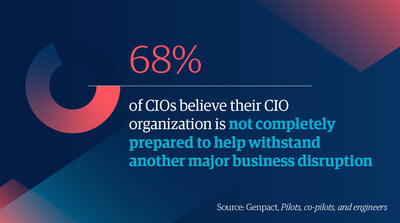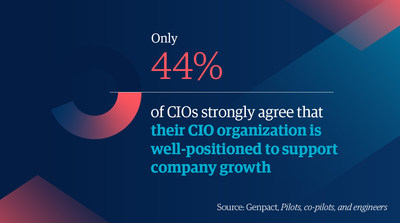Most CIO Organizations Are Not Fully Prepared for Next Major Business Disruption, Reveals New Study by Genpact and MIT Sloan CIO Symposium
Genpact's recent study, announced at the MIT Sloan CIO Symposium, reveals that 68% of CIOs feel unprepared for major business disruptions, while only 44% feel equipped to support post-pandemic growth. The research identifies three CIO archetypes: pilots (22%), co-pilots (61%), and engineers (17%). Successful CIOs must influence CEO agendas and be data-driven, with 98% agreeing on the importance of making data-driven decisions. Interestingly, 41% of CIOs prioritize employee wellbeing, yet HR technology investment lags, highlighting a potential disconnect in addressing employee needs in remote work environments.
- CIOs who invested in cloud migration, automation, and AI/ML adapted successfully during the pandemic.
- CIOs' ability to influence the CEO's agenda is crucial for driving strategic transformation.
- A strong consensus on the need for data-driven decision-making exists among CIOs, indicating alignment on future goals.
- 68% of CIOs believe their organizations are not fully prepared for future business disruptions.
- Only 44% are confident in their capacity to support growth post-pandemic.
- HR technology investment is prioritized the least, potentially impeding employee wellbeing efforts.
Insights
Analyzing...
CAMBRIDGE, Mass., May 25, 2021 /PRNewswire/ -- MIT SLOAN CIO SYMPOSIUM -- Despite a time of unprecedented investment in digital infrastructure and transformation, more than two-thirds (
Genpact's research, Pilots, co-pilots, and engineers: digital transformation insights from CIOs for CIOs, conducted in partnership with the MIT Sloan CIO Symposium, presents the views of 500 CIOs and technology leaders on lessons learned in weathering the storm of the pandemic and preparedness for the journey forward.
The study reveals three distinct types of CIOs: pilots, co-pilots, and engineers, each with varying levels of influence over guiding change in their companies. Only
A CIO's ability to drive digital transformation in the right places at the right time can make or break a business. During the past year's disruption, CIOs who invested in migrating data centers to the cloud, automating processes, upskilling employees, adopting advanced analytics, artificial intelligence (AI) and machine learning (ML) adapted most successfully. Looking to the future, pilots are innovating, co-pilots are modernizing, and engineers are playing catch up.
"Our global study validates what we're seeing across our clients. As the power of the cloud, data, and AI redefine the future of work, the CIO role is evolving exponentially, but not equally," said Sanjay Srivastava, chief digital officer, Genpact, who will present the research findings in a keynote today at the MIT Sloan CIO Symposium. "Transformation pilot CIOs who drive alignment across the C-suite and put the organizational focus on building resilience and innovation will be the co-creators of new business models and future-ready companies. CIOs who do not will see their organizations struggle."
Other significant findings from Genpact's CIO study include:
- Influencing the CEO's agenda is critical to CIOs' transformation success
The findings show that it is not enough simply to have access to the CEO, but rather to have a seat at the table in influencing the CEO agenda. It's clear that to drive strategic change, a CIO needs to report at a high organizational level, ideally to the CEO. But for the most successful CIOs, regular CEO meetings, not just reporting lines, make all the difference in the ability to leverage combined business and technology expertise to influence the company's strategic business agenda. - Being a data-led organization is imperative to success
CIOs are aligned on the need to be data driven. Almost all (98% ) agree that their companies make data-driven decisions to realize business value. Respondents cite AI and ML as the top technologies that will help CIOs achieve their goals, and the top choice for investment if they had additional financial resources. These technologies allow CIOs to make the most of the data at their disposal, generating predictive insights for more informed decision-making. - In the virtual world of work, CIOs are overlooking HR
As the pandemic forced more focus on employee safety,41% of respondents said that their CIO organization was responsible for helping to track employee wellbeing. Despite this, human resources still ranked last among the functional areas that CIOs prioritized for full-stack technology investment over the next two years. This warns of a potential disconnect in meeting employee needs with new remote and hybrid office models emerging. - CIOs are pivotal in connecting employee and customer experience
Accountability for the customer experience (CX) is something40% of transformation pilots believe their CIO organization is responsible for, compared to just22% of engineers. In fact, CIOs are uniquely positioned to connect CX and employee experience (EX) technologies. Only when employees are digitally enabled can they deliver the experiences customers expect.
"CIOs who are not prepared for business disruption and post-pandemic growth risk becoming obsolete," said Tom Davenport, distinguished professor at Babson College, visiting professor at Oxford, and research fellow at the MIT Initiative on the Digital Economy, and a co-author of the Genpact study. "Genpact's research provides insights on how all three types of CIOs can take the pilot's seat to accelerate digital business transformation and business growth."
Download the full report, Pilots, co-pilots, and engineers: digital transformation insights from CIOs for CIOs, for actionable insights.
About the Research
In March 2021, Genpact worked with the MIT Sloan CIO Symposium and Wakefield Research to survey chief information officers (
Respondents are from banking and financial services, insurance, healthcare and life sciences, high tech, consumer goods and retail, media and entertainment, and industrial manufacturing. They work for companies with at least
The study used online surveys with participation secured through email invitations. It also included in-depth interviews with over 25 CIOs – including winners of the MIT Sloan CIO Leadership Award – to add insights to the survey findings.
About Genpact
Genpact (NYSE: G) is a global professional services firm that makes business transformation real. Led by our purpose -- the relentless pursuit of a world that works better for people -- we drive digital-led innovation and digitally enabled intelligent operations for our clients. Guided by our experience reinventing and running thousands of processes for hundreds of clients, many of them Global Fortune 500 companies, we drive real-world transformation at scale. We think with design, dream in digital, and solve problems with data and analytics. Combining our expertise in end-to-end operations and our AI-based platform, Genpact Cora, we focus on the details – all 90,000+ of us. From New York to New Delhi, and more than 30 countries in between, we connect every dot, reimagine every process, and reinvent the ways companies work. We know that reimagining each step from start to finish creates better business outcomes. Whatever it is, we'll be there with you – accelerating digital transformation to create bold, lasting results – because transformation happens here. Get to know us at Genpact.com and on LinkedIn, Twitter, YouTube, and Facebook.
About the MIT Sloan CIO Symposium
The MIT Sloan CIO Symposium is a premier global conference that brings together a unique community of MIT academic leaders, CIOs, digital technology executives, and industry experts, enabling them to be more effective leaders. The Symposium offers an environment for engaging discussions where the best in-the-trenches business practices, technology innovations, actionable insights, and new ideas can be shared and debated. The Symposium is organized by the MIT Sloan Boston Alumni Association. For more information and to register for this year's Symposium, visit www.mitcio.com.
MEDIA CONTACTS:
Danielle D'Angelo
Genpact Media Relations – Americas
+1 914-336-7951
danielle.dangelo@genpact.com
Siya Belliappa
Genpact Media Relations – India
+91 9823133365
siya.belliappa@genpact.com
![]() View original content to download multimedia:http://www.prnewswire.com/news-releases/most-cio-organizations-are-not-fully-prepared-for-next-major-business-disruption-reveals-new-study-by-genpact-and-mit-sloan-cio-symposium-301298448.html
View original content to download multimedia:http://www.prnewswire.com/news-releases/most-cio-organizations-are-not-fully-prepared-for-next-major-business-disruption-reveals-new-study-by-genpact-and-mit-sloan-cio-symposium-301298448.html
SOURCE Genpact










